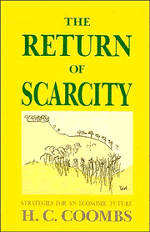Book contents
- Frontmatter
- Contents
- Introduction
- 1 Towards a Sustainable Society
- 2 Scarcity, Wealth and Income
- 3 Matching Ecological and Economic Realities
- 4 Science and Technology - For What Purpose?
- 5 Economic and Ecological Issues in Resource Management
- 6 Resource Management and Environmental Law
- 7 The Quality of life and Its Assessment
- 8 Is Democracy Alive and Well?
- 9 Technology, Economic Change and Political Strategy
- Bibliography
1 - Towards a Sustainable Society
Published online by Cambridge University Press: 05 August 2012
- Frontmatter
- Contents
- Introduction
- 1 Towards a Sustainable Society
- 2 Scarcity, Wealth and Income
- 3 Matching Ecological and Economic Realities
- 4 Science and Technology - For What Purpose?
- 5 Economic and Ecological Issues in Resource Management
- 6 Resource Management and Environmental Law
- 7 The Quality of life and Its Assessment
- 8 Is Democracy Alive and Well?
- 9 Technology, Economic Change and Political Strategy
- Bibliography
Summary
A long-term economic strategy should take account of:
the social purposes which the economic system can be expected to achieve or to promote, and
the major changes in the structure and operation of the system which, at least for the present, must be taken as given: changes which may derive from the internal working of the system itself or from the material and social context, national and international, within which it is operating.
The contemporary economic system is an historical artefact; it has developed over time from earlier simpler organisations. Its development can be traced back to the seasonal activities of the huntergatherers moving through their territory, to their division of functions within the family and the clan and to their ceremonial and ritual exchanges of scarce and valued resources and properties across tribal and language frontiers. It has, on the way, passed through the peasant, village economy based on largely self-sufficient domestic agriculture, pasturing on common land and home-based handicrafts and through the various stages of the Industrial Revolution.
Despite enormous increases in the range, content and organisational complexity of the system, the basic social purposes of economic activity remain the same. The prime social concern of hunter-gathering, of nomadic pastoralism, of peasant land use and of the contemporary industrial economic system has been and is to provide the members of the relevant social group or groups with access to a livelihood; to the material, social, intellectual and (to a degree) spiritual means to a healthy, secure and stimulating life.
- Type
- Chapter
- Information
- The Return of ScarcityStrategies for an Economic Future, pp. 1 - 20Publisher: Cambridge University PressPrint publication year: 1990



